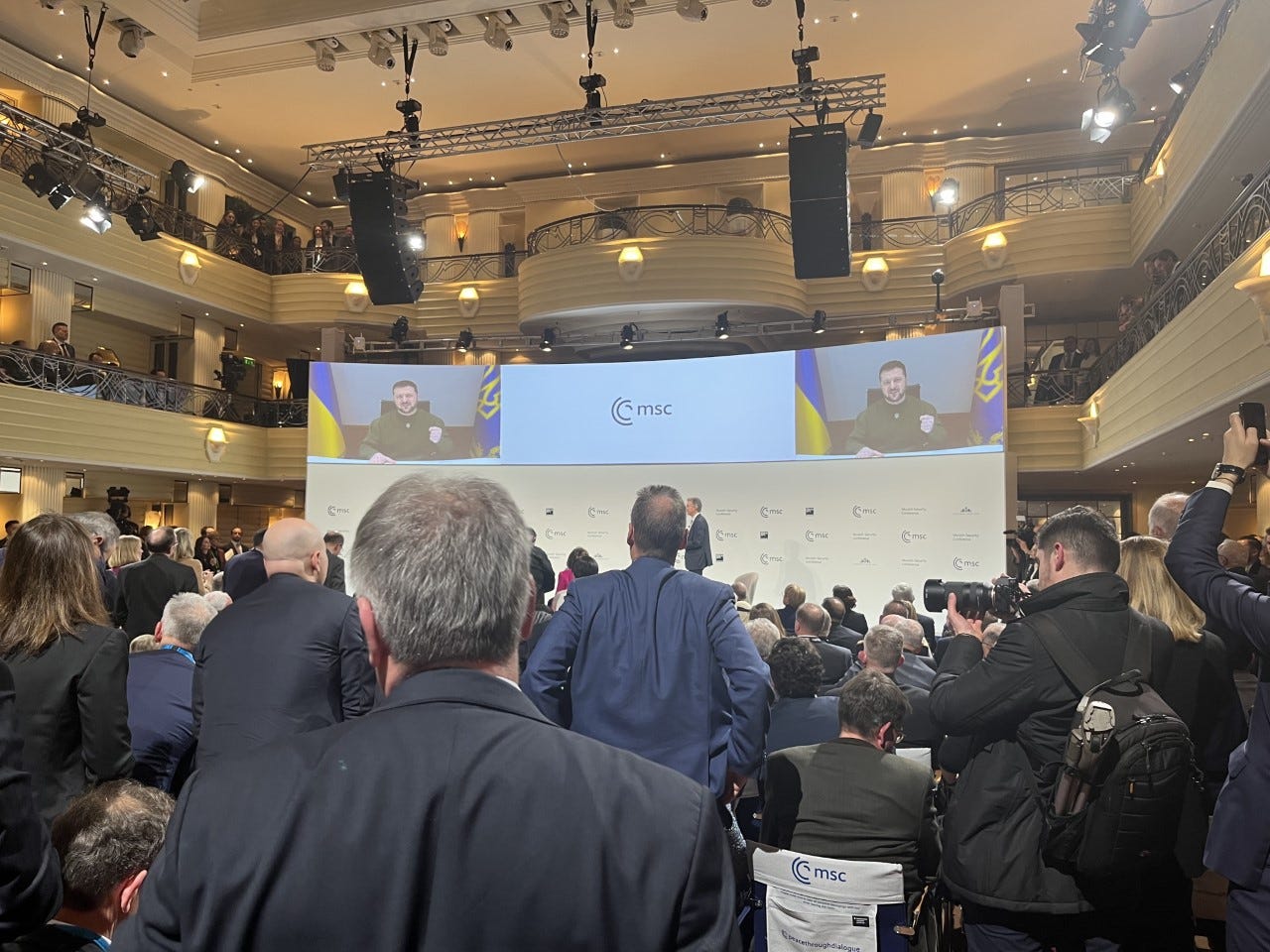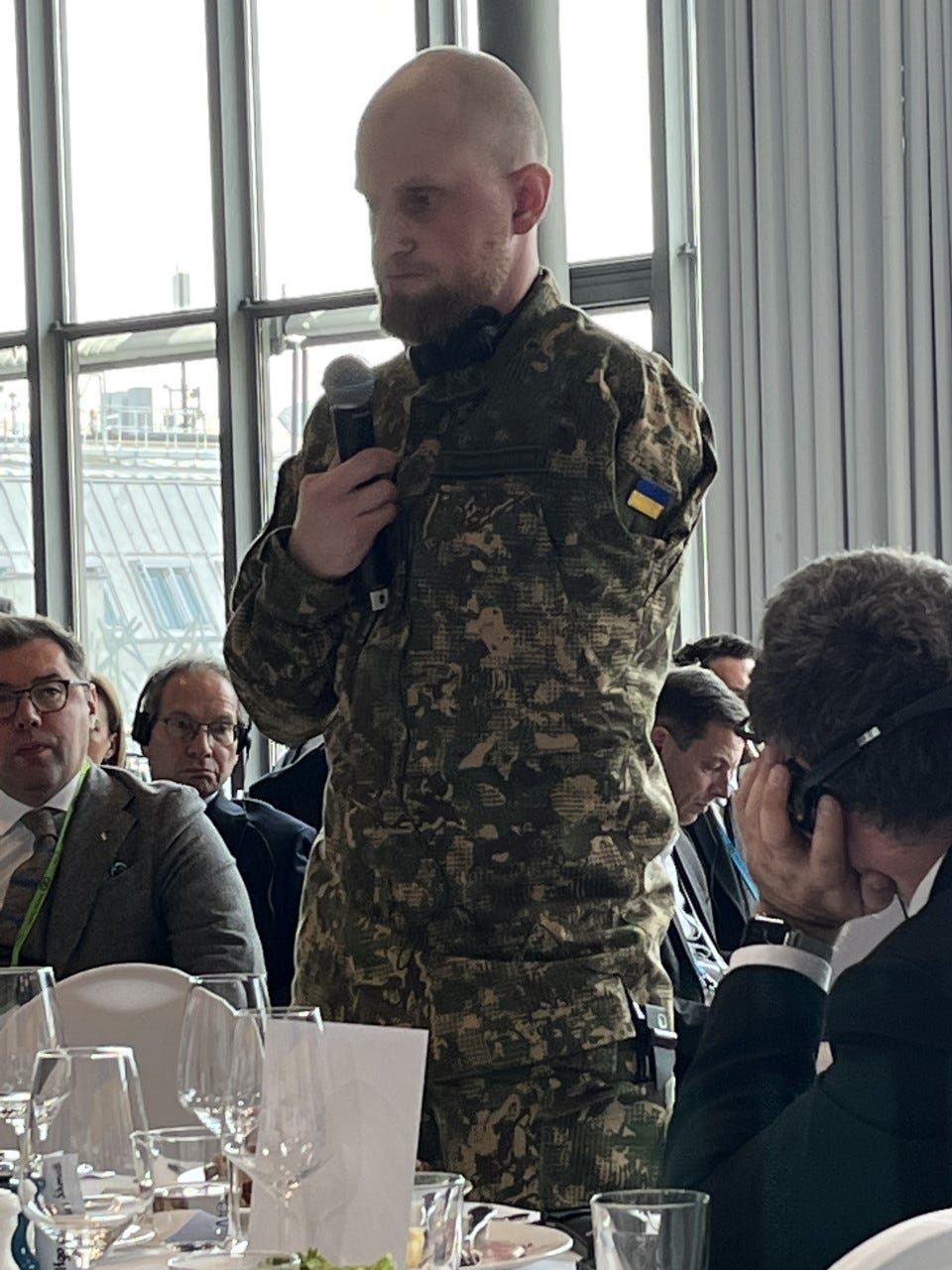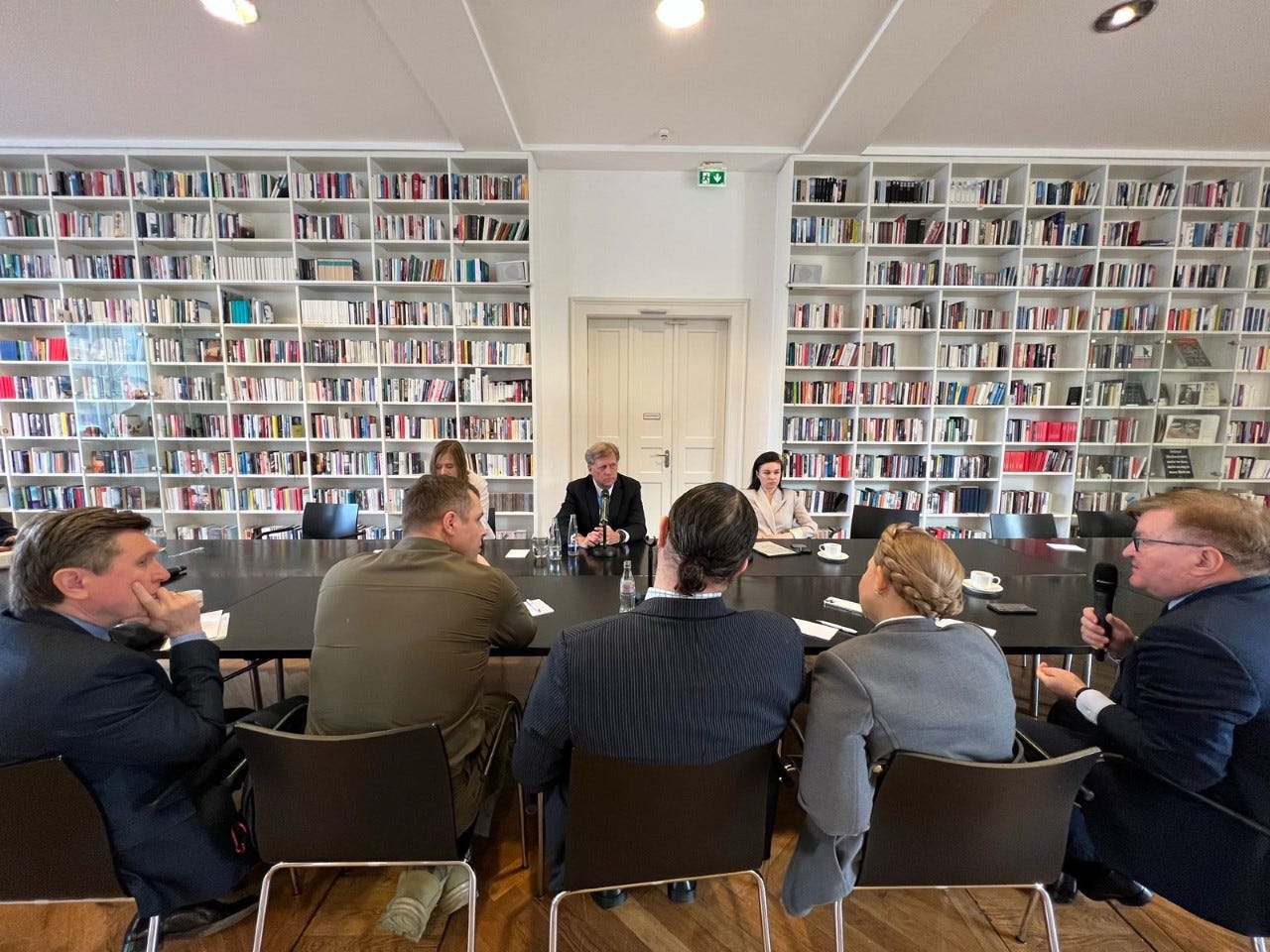My Munich Diary: “As Long As It Takes” Is Both Comforting and Unnerving
Time Is Moving Faster in Kyiv than Munich
I just got back from the Munich Security Conference last night. It’s one of my favorite conferences as it allows me to see many people from across the European continent and the world in just one long weekend. Until Putin invaded Ukraine, it was also one of the only places in the world that I could meet with Russians – diplomats, MPs, think-tankers, and businesspeople (aka “oligarchs”) – since I have been on Putin’s sanctions list since 2014. Thankfully, none of those people were invited this year. Instead, the Munich Security Conference rightly invited Russian opposition leaders -- Garry Kasparov, Mikhail Khodorkovsky, Leonid Volkov, Vladimir Milov, Julia Navalnaya (Alexey Navalny’s wife), Dmitry Gudkov, Zhanna Nemtsova, and others – to represent Russia. That was refreshing.
But I spent most of my time in Munich with Ukrainians – government officials, mayors, MPs, soldiers, civil society leaders, businesspeople, medics working on the frontlines, journalists, etc. I think I went to 2 dinners, 2 lunches, 1 breakfast, and numerous panels all devoted to Ukraine. President Zelensky spoke (via Zoom) too.
I came away with many impressions -- some new, and some confirmation of old assumptions. In this post, let me just mention two.
First, on the confirmation side. I came back from Munich even more inspired by the courage of Ukrainians. They are fighting heroically for a just cause. They are willing to sacrifice everything for their sovereignty, dignity, culture, identity, and democracy. And they already have sacrificed a lot. I heard many speeches in Munich about Ukraine, but the most moving ones (I got the chance to hear him speak 3 times) came from Dmytro Finyshan, a senior sergeant of the National Guard who lost his arm and more in the war but remained determined to keep doing whatever it takes to end Russia’s barbaric invasion of his country.
I also was deeply moved by a conversation with a frontline medical worker who told me horrific stories about Russian soldiers raping moms and daughters together. She asked to never let these victims become just statistics. They are real people, suffering horrific tragedies, being carried out by monsters.
Second, on the new impression side. I was struck by the dissonance about time between Western leaders and Ukrainians in Munich. As if coordinated, almost every democratic leader speaking in Munich – and there were many! – said their countries would be with Ukraine for “as long it takes.” The first time I heard that phrase, it sounded comforting to me. Vice President Harris, Chancellor Scholz Scholtz, President Macron, and others were signaling to Putin that they planned to be in this fight for the long haul. That’s a good message. But over the course of the conference, I had many Ukrainians explain to me why they didn’t actually take much comfort from that message. When they heard, “as long as it takes”, it implied to them that the war was going to be a long one, and they don’t want a long war.
They want the war to end as soon as possible. The longer the war drags on, the more Ukrainians will die. They worry that eventually, they will not have enough soldiers to fight a long war against the more populous Russia. So rather than pledges of solidarity for the distant future, they wanted faster and more support now, especially more and better weapons delivered as fast as possible to help Ukrainian soldiers achieve victory in the counteroffensive this spring, not in 2024 or beyond.
In his address to the Munich Security Conference, President Zelensky focused a lot on time:
“That is why we need to hurry up. We need speed. Speed of our agreements. Speed of delivery to strengthen our sling. Speed of decisions to limit Russian potential.
There is no alternative to speed. Because it is the speed that life depends on.
Delay has always been and still is a mistake.”
It is prudent to plan for a long war. But those countries assisting Ukraine should also do more to try to help Ukraine achieved victory in the short run – this year – as well. We can do both. One does not detract from the other.
And when discussing what is best for Ukrainians, should we not assume that they might know better than us? It is their sons and daughters, after all, who are dying every day; their families who are terrorized every night. When I heard some Western officials in Munich say that Ukrainians don’t need fighter jets, I wondered what they knew that Ukrainian leaders didn’t. I also had heard those arguments before. Patriots are too complicated to use, we were told. Abrams tanks run a jet fuel and are therefore hard to keep on the battlefield, we were briefed. And throughout the last twelve months, we also heard how this weapon or that weapon would be seen by Putin as too escalatory. And yet every time there were eventually delivered, Putin did not respond by using a nuclear weapon (that’s his only real escalatory move left). And Putin has no escalatory responses against NATO countries. He is not going to attack Poland in reaction to a shipment of MiG29s to Ukraine. He is not going to attack Estonia because we supplied ATACMs to Kyiv.
From four days of conversations with Ukrainians in Munich, I came home even more inspired by their bravery, but even more worried that we are not doing enough to help them end the invasion of their country as soon as we can. Time is on Putin’s side, not Ukraine’s, and not ours. Yes, we should pledge to support Ukraine “as long as it takes”, but also recommit to help end this war “as quickly as possible.”





I know this has been said in some comments here, but I think it is worth stressing again. I think Putin wants to run this into the US 2024 election. Without Biden, or certainly another Democrat as president, the unity will fail. The Ukrainians know this too. If Trump himself is elected, or anytime trying to appease his base, the support will end. The drumbeat has already started some time ago. It will not be a geopolitical argument here domestically, but rather a purely nationalistic financial one.... “How come we spend all of this money on Ukrainians...?” It will ignore all of the facts that Dr. McFaul and others have laid out here and that will have a visceral impact on those less engaged in these complex debates. So, time is running out... The Congress and the White House could be in Republican hands by Jan. 2025, less than two years from now and support will end, it seems to me.
This will also fracture the coalition Biden, and perhaps only Biden with 50 years of experience, built.
I know some will say that there are “normal Republicans” out there that see the bigger picture of this, but since 2015, they have been invisible on a range of issues.
It seems that there are many Republicans in power now who have a decisively Pro-Putin stance that seems hard to explain...
Excellent analysis. Putin has only one option left: to bleed Ukraine dry, both army and civilians. He's prepared to sacrifice as many Russians in that effort as it takes. We've seen already that sharp blows on his armies can trigger a local collapse. What is needed is a breakthrough of such magnitude the the whole rotten edifice of the VSRF gives way. That will not be achieved in dribs and drabs.